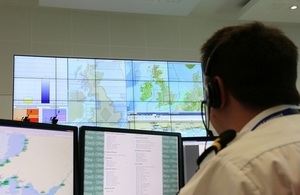Two fisherman saved from their liferaft after their vessel sinks
Two fishermen wearing life-jackets have been dramatically rescued from their liferaft by a passing fishing vessel after their vessel capsized off Prawle Point.

Two fishermen wearing life-jackets have been dramatically rescued from their liferaft by a passing fishing vessel after their own vessel capsized 3.6nm off Prawle Point earlier this morning.
The vessel had been on route from Plymouth to Brixham when the two crew realised that something was going wrong with the vessel. It began to list and they had just enough time to put on their lifejackets and get into a liferaft before it sank. It was at this moment that the EPIRB alert was triggered.
HM coastguard received a VHF radio broadcast just after 9am from a fishing vessel reporting that they’d just rescued two people from a liferaft after their vessel capsized and within 10 minutes they also received the EPIRB distress after it had been processed by the satellites. HM coastguard immediately sent the Salcombe RNLI lifeboat and the Hope Cove coastguard rescue team to the scene.
The rescuing fishing vessel reported that despite the frightening ordeal, both crew had been wearing lifejackets when the boat capsized and were thankfully rescued safe and well.
The capsized vessel sank a few minutes later. The Marine Accident Investigation Branch (MAIB) and the receiver of wreck have been informed, as well as the MCA’s counter pollution team.
HM coastguard duty controller James Instance said: “This incident happened so quickly that the casualties on the capsized vessel weren’t even able to make a mayday call or trigger a DSC alert. Thankfully they were seen by a nearby vessel that went to them straight away. However the crew were also well-prepared in the fact that they had an EPIRB on board and shortly after the call we received an emergency signal from that beacon giving us their exact location. If we hadn’t have received the call from the rescuers we would have sent a helicopter and lifeboats directly to the position of that alert. EPIRBs are designed to activate when they hit the water automatically sending the coastguard your position which is displayed on our charting system – in this case when the boat capsized. It just goes to show how quickly things can go terribly wrong before you get a chance to notify the coastguard. We’re delighted that in this situation the crew were able to take action by wearing their lifejackets and deploying their liferaft to prepare for the worst.”
Safety advice - when heading out to sea you should always make sure you have a means of alerting us if you get into difficulty. We can never get time back, speed is of the utmost importance – don’t wait for things to improve. You need to inform us as soon as a potentially difficult situation is developing - once things start to go wrong, they can develop rapidly. Always carry a means of alerting the coastguard if you get into difficulty.
We recommend your vessel has an EPIRB and a fitted Digital Selective Calling (DSC) VHF radio, a fully charged mobile phone, flares, powerful torch, a personal locator beacon and appropriate personal floatation devices such as a lifejacket or buoyancy aid at all times whilst on deck. VHF coverage along the coast is generally much better. If you get into difficulty use channel 16 to alert the coastguard to your position. When you make an emergency call to the coastguard from VHF radio you will tell everyone within range what your situation is even if you cannot see them – there might be someone nearby who can help you more quickly. If you are at sea and only have a mobile phone you will only be able to speak to the person you are making the call to. If mobile network coverage is poor then you might not be able to make a mobile call at all. If you have got a signal call 999 and ask for the coastguard.
For remote locations, consider carrying a 406 personal locator beacon to raise the alarm. Maintain your safety equipment, cutting costs will not help you in an emergency.
HM coastguard is also happy to receive radio checks from fishing vessels if they wish to check their equipment before heading out to sea. You should always have a plan on board for ‘what if?’ and make sure everybody on board knows their part within the plan. In this case, the vessel’s EPIRB alerted HM coastguard and the nearby vessel responded quickly was able get these two casualties safely rescued.